Imagine you're opening a clothing store in your town. You've hired employees, obtained all of the items you’ll sell, planned your store’s layout, finalized your branding, and purchased your POS system. But wait… you haven’t signed a lease on a storefront. You don’t actually have a physical space for your store yet.
This is what it’s like to have a website without a web hosting service. Your domain and web page files exist, but visitors won’t be able to find your website on the internet. Similarly, your retail store’s customers won't have anywhere to visit and shop if you don't have the physical space.
Let's fix that — in this guide, you’ll learn the importance of finding a web hosting service that not only supports your site but also meets your needs.
Chapters
What is web hosting?
Web hosting is how you share your website on the internet for people to visit. A web hosting service or provider (a.k.a. a web host) allows you to do this.
How does all of this happen? Good question.
How does web hosting work?
Websites are hosted on web servers. Servers are powerful computers that store and process data, and web servers are those which store the files that make up websites and process requests to view these files.
When a visitor clicks a link to your website or plugs your site's URL into their browser, they're making a request to connect to your web server. Once this request is approved, the web server sends back the specific web page file that was requested and any associated files. This is what makes your website appear in the visitor's browser.
Note: Some web hosting services require you to obtain a domain name before choosing your hosting your plan. Determine if you’ll purchase your domain via a domain registrar prior to picking your hosting service, or if you’ll purchase one from the hosting service you choose to work with (assuming they offer that option). You might also want to consider your URL structure, like whether you want a subdomain or subfolder.
In addition to housing your website on the internet, web hosting services typically offer various levels of support, security, and the benefits of high performance and uptime. Uptime is how often your website is operational — 99.9% uptime means your website can be accessed 99.9% of the time.
There are literally thousands of web hosts out there, and the key is finding the right service for your website and small business. So, before we review some popular services available today, let’s talk about how you should go about choosing one.
How to Choose a Web Hosting Provider
- Choose the type of hosting you want for your website.
- Identify which type of website you’re creating.
- Determine which features you want in a web hosting service.
- Think about the web hosting support you need.
- Take your website’s growth into consideration.
- Set a budget for your web hosting service.
- Consider free vs. paid web hosting.
- Pick a web hosting provider.
1. Choose the type of hosting you want for your website.
As the owner of a retail store, you’ll have to choose the right space to support your store's infrastructure. Similarly, you’d need to choose the right web hosting service to effectively run your website for your visitors and customers.
There are several different hosting options for small, medium, and large businesses to consider — let’s take a look at some of the most common.
Types of Web Hosting
- Shared hosting stores your website on the same server as multiple other websites. As a result, it's the least expensive hosting option. Although shared hosting is cost-effective, it’s only ideal if your site has consistently low levels of traffic, since you’re sharing that server's resources with dozens or possibly hundreds of other businesses and individuals.
- Virtual private server (VPS) hosting is a bit more expensive than shared hosting and is ideal if you have a bit more traffic coming to your site regularly. VPS hosting mimics having a dedicated server just for your website, even though it’s technically still a type of shared hosting. VPS offers more customization and better performance than shared hosting while still being cost-effective, making it a common first hosting choice for small businesses.
- Dedicated server hosting is a more expensive hosting option — it’s meant for websites that see large amounts of traffic over extended periods. With dedicated hosting, your website has its own server. This means your business has full control over your systems, security, and everything else related to your server. However, this option requires a high level of expertise — you need personnel who can manage your server appropriately.
- Managed hosting means the web host will manage your server (including operation, security, maintenance, and more) so you don’t have to. This is ideal for small businesses that don’t have or want to hire a team member who understands the technical side of a web server. Managed WordPress hosting is popular within this category since these servers are specifically optimized to run WordPress websites.
- Cloud hosting is a newer option in the world of web hosting. It allows many separate servers to work together to behave like one large server. This type of web hosting works well for growing businesses — as websites increase traffic and volume, the cloud space can also expand. Because of this setup, cloud hosting is typically pay-by-use: You pay for the amount of cloud space you need at any given time.
2. Identify which type of website you’re creating.
Decide on the type of website you want to create. By doing so, you’ll be able to better follow the steps in this process as well as narrow down your hosting service choices.
For example, the type of website you create will be a lot different if you’re publishing a blog versus selling products. The most common types of websites people create are:
- Blog websites
- Online stores
- Online portfolios
- Individual websites (startup or small business)
- Business websites (small-to-mid-sized or large business)
When determining the type of website you want to create, also ask yourself:
- Why am I creating this website?
- What type of business do I have?
- How large is my business and how much traffic can I expect?
- Who is this website for?
3. Determine which features you want in a web hosting service.
Once you identify your website type, determine which features you need from your web hosting service.
For instance, if you’re the owner of an online-only store, you’ll have to make sure your host supports ecommerce. And if you’re a small or mid-sized business that’s growing quickly, you’ll need to ensure your hosting service can scale with you — this will save you the trouble of switching providers in the future.
4. Think about the web hosting support you need.
Like our personal computers, servers need to be maintained and updated to keep performance optimal and contents safe. Consider how much work you want to invest in this upkeep.
As you learned above, different hosting services offer varying levels of technical support such as security, maintenance, installation, and optimization. To make the right hosting decision for your small business, determine whether or not you have a member of your team (or plan to hire one) to manage your server. If not, consider managed hosting.
Also, think about the size of your business and your expected typical amount of site traffic. Then ask yourself, “If there was an issue with our website that couldn’t be resolved immediately, are we at risk of losing customers and ruining any level of trust we’ve built between them and our brand?”
These conclusions will help you decide how much support you require from your service provider.
5. Take your website’s growth into consideration.
Do you plan to scale your business significantly, or do you plan to stay the same size long-term? Do you foresee a drastic change in your website traffic as you scale, or do you expect your follower base and number of visitors to remain steady over time?
The answers to these questions — as well as your business type and industry — will help you choose an appropriate hosting service for your planned and estimated growth.
If you know you’re going to experience significant traffic on your business site, it might be worth investing in a dedicated server. If your expected growth and traffic are somewhat unknown but have the potential to change drastically over time, cloud-based hosting is a viable option. And if you’re a blogger who wants to share travel stories with friends and family, a shared server is likely all you’ll ever need.
6. Set a budget for your web hosting service.
How much does web hosting cost? The answer isn’t a simple one — it depends on the provider you choose, the type of hosting you need, and which plan you invest in. Still, this is one of the most important factors in your decision, especially if you're a small business.
This is why we recommend you take a deep dive into the information on each service’s pricing pages, like this shared hosting pricing table from Bluehost:
There are free web hosting services (which we’ll touch on below) as well as options that may cost anywhere from a few dollars per month up to several hundred dollars per month. Typically, shared hosting is the least expensive option and dedicated hosting is the most expensive.
In general, the more you pay for your hosting, the more bandwidth you’ll receive, the more security protections you'll have in place, and the more features and perks you can access (e.g., SEO tools, backups, analytics, and site builders). Many providers will try to upsell you on these features, so it’s best to go into your search with a set budget in mind.
7. Consider free vs. paid web hosting.
As mentioned, there are several free hosting providers that won’t charge a dime to host your pages. We’ll list some options in the next section. However, if you’re interested in free hosting, there are several drawbacks.
First, free hosting providers impose far more limits than paid providers: limited pages, limited, storage, limited bandwidth, and limited uptime. Fewer pages and storage affect your site’s ability to grow. Low bandwidth and uptime mean slower (or nonfunctional) web pages, which mean fewer happy visitors and poor search engine performance.
Second, many free providers will insert their own branding or advertisements into your site. This could take the form of their name in your site’s URL ("example.wordpress.com"), the provider’s logo on your pages, and/or display advertisements. And no, you won’t be making money off these ads — all profits go to the host.
Finally, though perhaps most importantly, free hosting servers tend to be less secure and lack the proper security measures like encryption, firewall, and spam blocking. A successful attack on your server can impact your reputation far more than a temporarily inactive page or a banner ad. And, with security breaches on the rise, it’s not something to take lightly.
To sum up, we’d only recommend free hosting services for hobbyists who don’t plan to scale their website or store any private information. A small business, blogger, or any other website owner looking to grow their online presence should invest in a paid plan within their budget range.
8. Pick a web hosting provider.
Now that you have all of the information you need to narrow down your web hosting service options, it’s time to choose the right one for you. In the next section, we’ll review 11 of the most popular and top-rated web hosting services for your consideration. We'll also throw in some free options too.
While choosing a provider, reference the conclusions you made throughout the above steps. You can also study reviews and testimonials real customers have shared via sites like Web Hosting Geeks.
Lastly, you can consult the individual websites of the services you’re considering — just know that they are, of course, biased.
Best Web Hosting Sites
- CMS Hub
- Bluehost
- SiteGround
- One.com
- Hostinger
- LiquidWeb
- Nexcess
- Google Cloud
- GoDaddy
- WP Engine
- Wix
- A2 Hosting
- Squarespace
- HostGator
The hosting providers listed below all include multiple options, making them great for small businesses up to medium and large companies in need of more powerful hosting.
1. CMS Hub
Pricing: Starter Plan; $23/month, Professional Plan; $360/month, Enterprise Plan; $1,200/month
CMS Hub is a web hosting and content management system built on HubSpot’s CRM platform. It provides all the tools you need to easily create and manage beautiful, optimized websites according to your needs.
With CMS Hub, you can easily create, manage, and optimize website pages to host your content securely and effectively for search and mobile with automatic responsive design and secure sockets layer (SSL). And you’ll enjoy the ability to personalize user experience (UX) based on information about your contacts with smart content or CTAs and design site pages with pre-built or customized website templates.
What We Like: You can integrate the CMS Hub with other marketing, sales, and service tools seamlessly to create an all-in-one platform for your business.
2. Bluehost
Pricing: Basic Plan; $2.95/month, Plus Plan; $5.45/month, Choice Plus; $5.45/month, Pro Plan; $13.95/month

Bluehost is a web hosting service that provides users with the ability to manage different types of websites. From hosting a shared, VPS, dedicated or WordPress hosting, it’s an ideal option for small businesses looking to improve digital marketing needs on a budget.
Users can take advantage of a free domain name for the first year of use and access reliable support 24/7, making it even more convenient for its customers.
What We Like: In addition to its wide range of web hosting services, Bluehost provides marketing training, SEO services, social media marketing, content creation, graphic design services, email, domain names, and local business listings to grow traffic.
3. SiteGround
Pricing: Startup Plan; $2.99/month, GrowBig Plan; $6.69/month, GoGeek Plan; $10.69/month
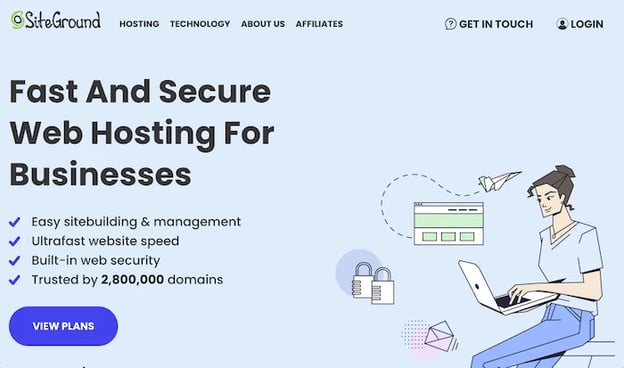
The web hosting company, SiteGround, offers three shared hosting plans that adjust to the needs of most users. Whether you’re starting from scratch or scaling, you can choose whether you want to work with the easy-to-use site builder to launch your small business website, or simply migrate your website.
SiteGround is equipped with the latest technology like Google Cloud infrastructure and LiteSpeed web servers to automatically backup your sites daily, maintain fast load times, and offer a reliable web hosting service customers are looking for.
What We Like: SiteGround displays an authentic commitment to helping its customers succeed by including its own malware/virus scanning software and isolation technology. This feature prevents infected websites from taking down other websites on a given server.
4. One.com
Pricing: Beginner Plan; $4.99/month, Explorer Plan; $7.99/month, Enthusiast Plan; $9.99/month, Guru Plan; $19.99/month
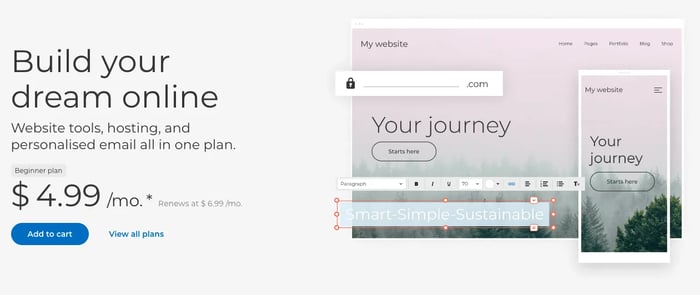
f you’re looking for a one-stop shop for your website, one.com is a great option. They offer domain names, hosting, and a website builder, making it as easy as possible for anyone to build their website and online presence.
Their website builder is included in all pricing plans and comes with 175+ templates to get your website started. Additionally, one.com also offers a Managed WordPress solution if you're already online.
What We Like: one.com is an all-in-one plan, and includes everything you need in their hosting plans, including a website builder and SSL certificate making it easy if you're experienced in website creation. Additionally, they provide 24/7 support to their customers for any needed assistance.
5. Hostinger
Pricing: Web Hosting Plan; from $1.99/month, Cloud Hosting Plan; from $9.99/month
Whether you’re creating a new home on the web or looking for an upgrade over your current hosting provider, Hostinger is a wonderful option to check out. This service provider is known for quick hosting speeds, across its shared hosting, VPS hosting, cloud hosting, and managed WordPress hosting options.
Not only do you get blazing fast site speeds on a Hostinger plan, but those plans come at some of the most competitive price points around. They offer a free website builder with their hosting plans, which is easy to use too, with over 100 templates to drag and drop your way to a beautiful webpage design without knowing how to code.
What We Like: You can enjoy a free domain, website builder, AI tools, and BitNinja security with the purchase of any web hosting plan.
6. LiquidWeb
Pricing: Contact for Pricing
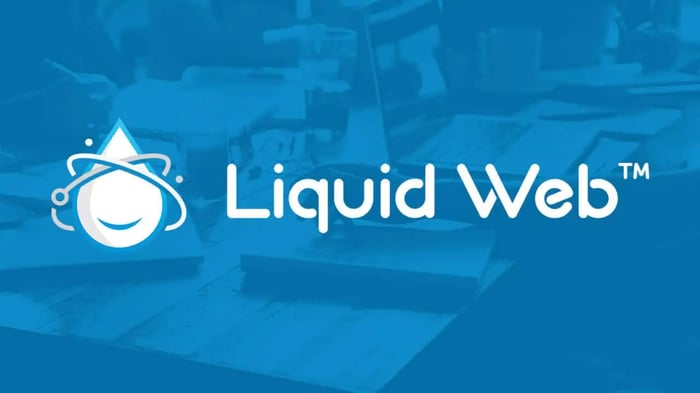
LiquidWeb offers a variety of hosting services including VPS, cloud, enterprise, and WordPress-specific options. This means that matter what type of website you have or are planning to build, LiquidWeb will have a hosting service available that will fit your company's needs.
What's nice about this hosting provider is that they do as much of the work as you want them to do. If you want a hands-on experience with an expert walking you through each step, LiquidWeb is happy to provide that service for you. In contrast, if you'd rather have no help at all and struggle your way through it, LiquidWeb will be there as an option for you to call if you get stuck and find yourself cursing at your computer out of frustration.
What We Like: It's clear that LiquidWeb cares deeply about customer service. From the packages it offers to the various "promises" on its website, LiquidWeb assures you that it will be there to help if anything goes wrong or if you have any questions. This assures the buyer that they won't be on their own if they're navigating web hosting for the first time.
7. Nexcess
Pricing: Contact for Pricing
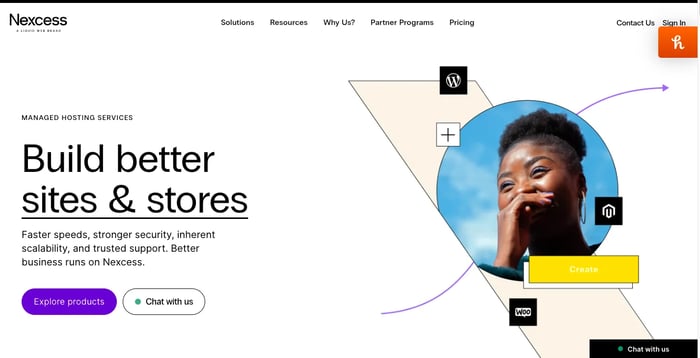
Nexcess is an enterprise web hosting provider that's used by over 500K websites. It offers solutions for WordPress users, Magento accounts, WooCommerce pages, and more.
Nexcess stands out from the competition by offering free website migration services. If you already have a website and want to move it over to Nexcess, this hosting provider will handle the entire process for you so you don't have to deal with the headache of migrating your site. Not only is this service free, but it's also fast so you'll have minimum downtime before you can get your site back up and running again.
What we like:
- Will fix broken or botched migrations from previous hosting providers
- Hosting servers are located around the world with a near 100% uptime
- WordPress-specific hosting solutions like premium plugins and a built-in CDN
8. Google Cloud
Pricing: Available upon request
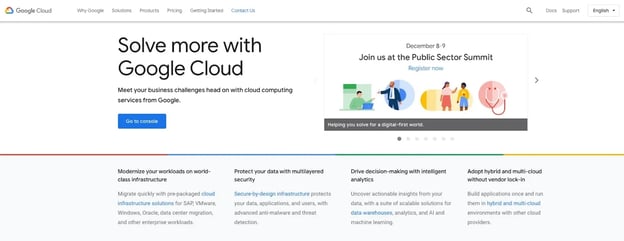
Google Cloud web hosting is a versatile service for static and dynamic websites with the same hosting infrastructure used by major websites like Google and Youtube. Users pay for exactly what they use in the Google Compute Engine, to click and deploy over 100 web-serving solutions.
Google Cloud also helps businesses start from scratch by providing website basics like getting a domain name, business email, web building without code, and setting up online ads built for the world’s most popular search engine.
What We Like: Google Cloud hosting is unrivaled in network throughput. A recent comparison of the top three cloud providers showed Google Cloud VMs have nearly three times the network throughput of their AWS and Azure counterparts. Google’s bottom-performing network throughput machine performed 65% and 105% better than AWS’ and Azure’s top-performing machines.
9. GoDaddy
Pricing: Web Hosting; $4.33/month, WordPress Hosting; $8.99/month, WordPress Ecommerce Hosting; $20.99/month, Business Hosting; $19.99/month, VPS Hosting; $4.99/month
If you are looking to get a website set up quickly and fairly painlessly, GoDaddy may be the answer for you. You can choose between several different types of hosting that are offered including shared, business, VPS, dedicated, and WordPress. And since GoDaddy is more popularly known for its domain registration, they offer a free domain to those who purchase any of its web hosting options.
GoDaddy offers amazingly responsive customer service 24/7, quick load times courtesy of its multiple data centers around the world in the United States, Europe, and Asia.
What We Like: The How-To section on GoDaddy’s website is an extensive resource unlike any other hosting provider. It has playlists of video guides that go beyond troubleshooting, and help your website succeed through things like how to plan your online presence, how to set up your email, marketing basics, and much more.
Comes with free SSL, no matter the plan you choose.
10. WP Engine
Pricing: Startup Plan; starting at $19/month, Professional Plan; starting at $47/month, Advanced Solutions available upon request
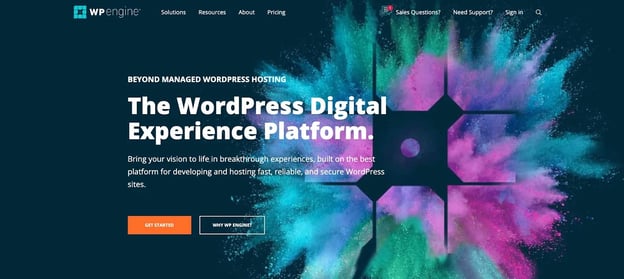
WP Engine is a WordPress-specific web host, offering fully optimized, managed plans for the platform. As pioneers in the managed WordPress hosting industry, the business boasts an impressive customer list including Yelp, Asana, National Geographic, PBS, and MyFitnessPal.
It offers quick and easy migrations from your old host, a free secure socket layers (SSL) certificate for security, support for setting up staging sites, and plenty of performance tracking and diagnostic options.
What We Like: WP Engine has a page performance solution that tests your site for SEO and helps you make improvements, and GeoTargeting to optimize your site for specific regions of your choosing.
11. Wix
Pricing: Combo Plan; $16/month, Unlimited Plan; $22/month, Pro Plan; $27/month, VIP Plan; $45/month

Wix is a web hosting and drag-and-drop builder that makes it easy to create a professional website, without having to know how to code. With over 800 professionally designed templates and tools, Wix lets you create and sell through your site.
Beginner-friendly and scalable, Wix is suitable for anything from personal online portfolios to small business websites, with easy-to-use SEO tools to help your site rank better and load faster (with the help of its 15+ servers located around the globe).
What We Like: Using Wix is especially advantageous for small businesses selling online, as it charges no transaction fees, and helps you reel lost customers with abandoned cart recovery features even at the lowest pricing plan.
12. A2 Hosting
Pricing: Startup Plan; $2.99/month, Drive Plan; $5.99/month, Turbo Boost Plan; $6.99/month

If you’re building a website for the first time or starting an online company, A2 will help you do just that. It’s fast and offers both excellent customer service and competitive pricing on long-term, standard shared hosting plans, with a reliable money-back guarantee.
A2 Hosting offers shared and managed WordPress hosting, VPS Hosting, reseller hosting, and dedicated hosting. A2 Hosting also provides e-commerce hosting, which is essential if you plan to make an online store. They are compatible with various e-commerce software and solutions that make it easy to set up an online store.
What We Like: A2 Hosting is known for its “high powered hosting”, making speed and reliability its top priority. The provider calls its solid-state drives (SSDs) “Turbo Servers” that can load pages up to 20 times faster than a typical non-SSD server with the purchase of the Turbo Plan.
13. Squarespace
Pricing: Personal Plan; $14/month, Business Plan; $23/month, Basic Commerce Plan; $27/month, Advanced Commerce Plan; $49/month

Squarespace is a website building and hosting service designed to help people build their own websites and showcase their work, no matter the level of technical ability. You can choose from dozens of professional and creative website template options for small businesses, ecommerce sites, and more.
Squarespace gives you everything you need for your business to succeed from the very beginning. Not only can you use Squarespace’s designs to create a unique website, but it makes your life easier through tools like premade email campaigns, built-in analytics, Ecommerce functions, SEO tools, and integrations with G Suite and PayPal.
What We Like: Alongside unlimited storage and bandwidth, Squarespace co
14. HostGator
Pricing: Hatchling Plan; $2.75/month, Baby Plan; $3.50/month, Business Plan; $5.25/month
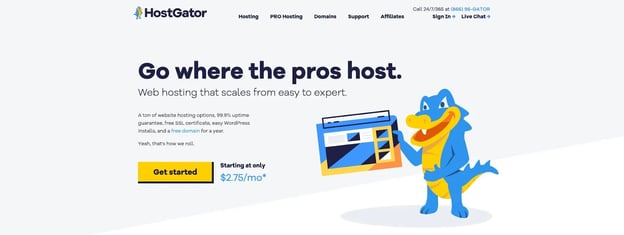
With HostGator, you can start any site on a budget. It’s widely accessible for entry-level beginners searching for a low barrier to entry hosting service. And yes, they have plenty of customer support available, along with a live chat feature you can tap into at any time.
Not only is the hosting provider known for affordability, but they also offer free WordPress migrations, SSL certification, and a domain name at no extra cost to you.
What We Like: New customers can use $150 worth of Google Ads and $100 worth of free pay-per-click Bing ads to help give your business the visibility it deserves.
Free Web Hosting Services
A few of the options we reviewed above offer free hosting plans to get you started with their service — meaning, services that are free for a limited amount of time. But, if you’re looking for something totally free, try one of our recommendations:
1. InfinityFree
Pricing: Free

Infinity Free is one of the best web hosting providers available without a price. And to make it even better, it comes with no expiration date. Its one-and-only solution includes some features from commercial-level hosting like unlimited disk space, expansive bandwidth, industry-standard cPanel, and the Softaculous one-click installer.
You can also enjoy the added benefit of a free subdomain and SSL certificates.
What We Like: Even with its free web hosting service, you’ll never have to worry about your website being cluttered with ads.
2. WordPress.com
Pricing: Free
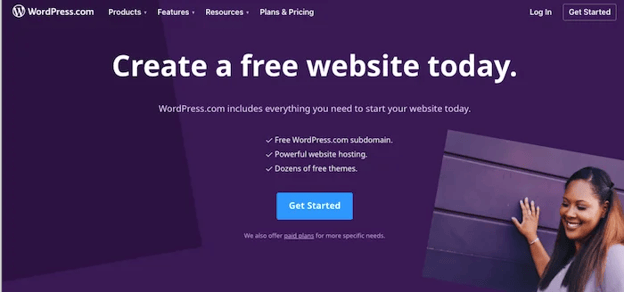
Chances are you’ve already heard of the widely popular web hosting service, WordPress. And well, it’s just that. WordPress is well-trusted and has built years of reputability from delivering on its ease of use and ready-made website themes and open-source knowledge base.
Now you can pay for its JetPack plan for added tools like basic SEO, site statistics, and social media sharing features, but you can incorporate third-party tools just as easily.
What We Like: It's extremely flexible, meaning you have complete control over the design and functionality of your website.
3. Wix (Free)
Pricing: Free

Wix’s free plan isn’t lower in quality, it actually still provides users with useful tools and guidance to host and make the website they need.
Wix emphasizes its ease-of-use, customer support quality, and still provides many pre-made website templates to build off of at no cost to you.
What We Like: Wix provides your website with free and secure hosting, and SEO tools to rank higher in search engines.
4. Weebly
Pricing: Free

Weebly is a web hosting provider suited for beginners. The service provider includes free marketing tools for SEO that can assist in lead capture and social media marketing practices.
And despite that it’s free, users are given a free SSL certificate when they start.
What We Like: It provides step-by-step guidance on how to build your website from scratch, and does a particularly good job in educating users on SEO to boost visibility.
5. 000WebHost
Pricing: Free
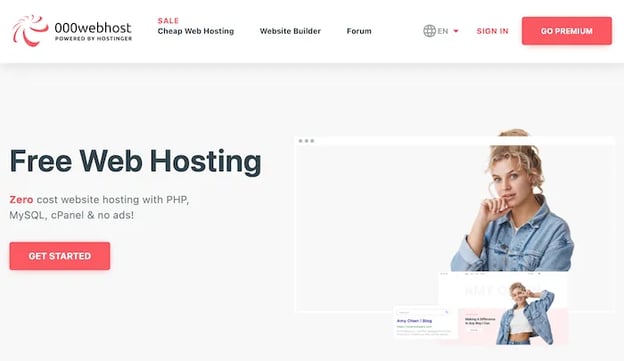
000besthost is a great option for those who already have a domain. It’s an easy-to-use website builder that requires no technical skill to create, and offers users two subdomains at no cost.
It also provides hundreds of free templates and courses on everything from web development and SEO to digital marketing and game development.
What We Like: 000webhost is another free web hosting service that doesn’t place ads on your website.
6. Byethost
Pricing: Free
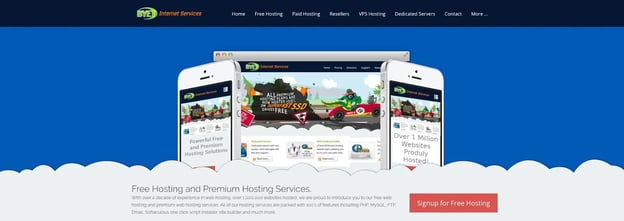
Lastly, Byethost is a free web hosting service that can help small businesses or hobbyists run a more simplistic website.
Users can enjoy unlimited data transfer, MySQL databases, addon, and parked domains. There's 5GB of web space, its Softaculous platform gives you automatic installation of WordPress and hundreds of other popular web applications, and there's a free website builder (with platforms) if needed.
What We Like: Byethost will not place ads on your website despite its free web hosting service.
Find Hosting for Your Small Business
Your website needs a hosting provider to be accessed over the internet. Choosing a hosting service that suits your needs and is tailored to your expected growth is critical to the success and performance of your website. We hope you follow the steps we outlined above and consider the plethora of service options available so you can make and host a website that gains the visibility and engagement you want.
Editor's note: This post was originally published in February 2020 and has been updated for comprehensiveness.


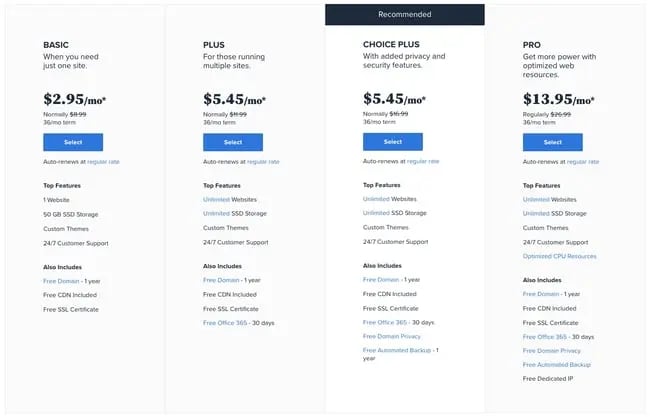

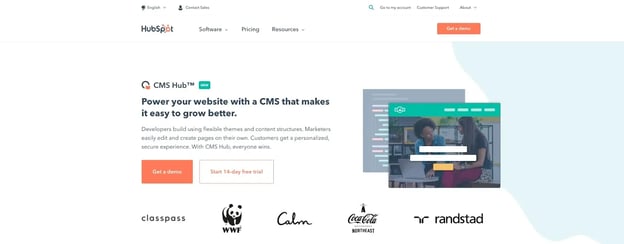

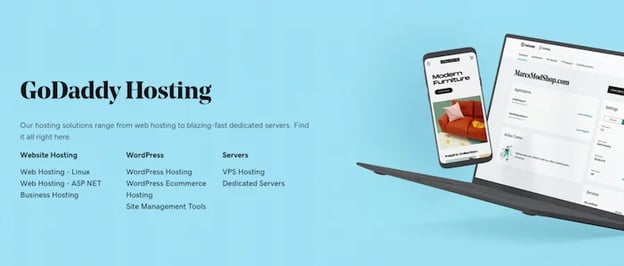





.webp)



